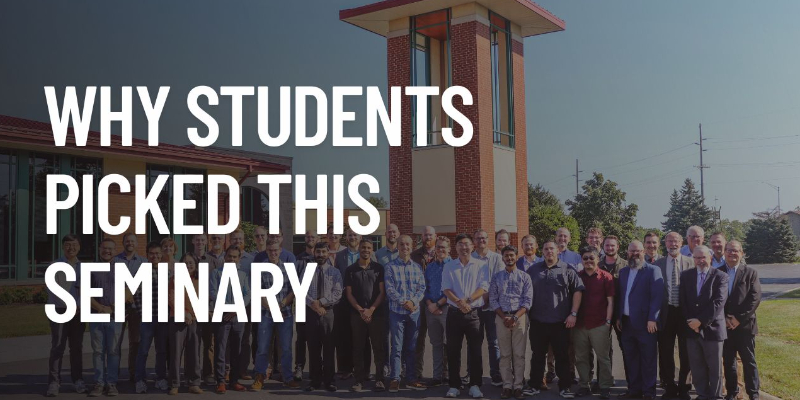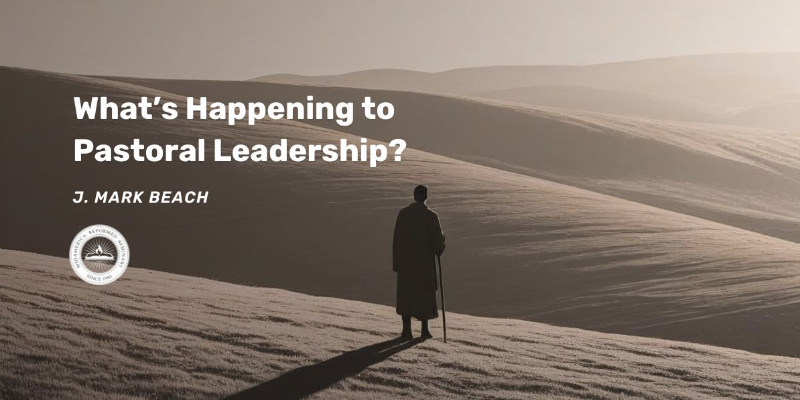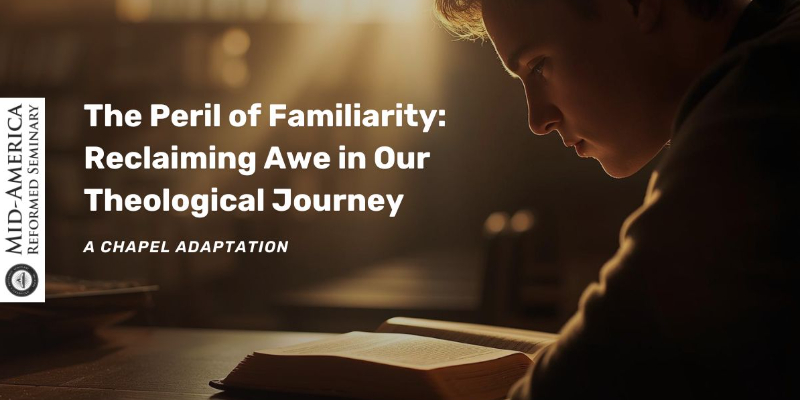
The Old Testament: A Field Manual for World Missions
When Christians think about any kind of mission mandate from Scripture, they turn to Matthew 28:18-20, among other passages. Rightfully so! In this passage, the risen Jesus Christ makes two indicative statements that surround the command to go to all the nations. Jesus tells His disciples, and us, the readers, that He has universal authority in heaven and on earth. He also promises to be with His people until the end of the age. The risen Christ will be with His church until history ends. Between those two statements is this commission: “Go to all nations, baptizing them in the Name of the Father, Son, and Holy Spirit, and teach all these nations to observe everything that I have commanded you.” In this way, the church is commissioned to be engaged in the mission of bringing the good news of the Lord Jesus Christ to all peoples so that they might receive His free gift of salvation and life in the light of His Word.
I would offer this thesis as we think about the commission that Jesus gives to His church: the Matthew 28:18-20 commissioning is the appropriate updating of the very first mandate that God gave to us in Genesis 1. At the creation of man, God commissioned man to be fruitful and multiply, fill the earth, subdue and rule the entirety of creation on behalf of God the great Creator and Ruler over all. If there had been no fall into sin and no rebellion against God, then the world would have been filled with people who were image-bearers of God, identified spiritually as God’s sons and daughters, human beings who were observing everything that God had commanded them. But in fact, sinful rebellion on the part of Adam and Eve caused the entire human race to be plunged into guilt before God, as well as corruption in body and soul in full rebellion against the living God, a rebellion that can only end in God’s just wrath, judgment, and eternal death.
But how do we get from the mandate of Genesis 1 to the commissioning of Matthew 28? Redemptive history fleshes out the story, the great narrative of the covenant of grace. God inserts enmity between the seed of the serpent and the seed of the woman (Genesis 3:15). The seed of the woman are those people who are made spiritually alive by God’s grace in order to combat the evil represented by the serpent’s seed. The pre-eminent Seed of the woman is the Lord Jesus Christ (Galatians 3:16), who by His complete work, finished once and for all, has crushed the serpent’s head, removed the guilt of God’s elect by His atoning death on the cross, conquered the last enemy, death, and even now intercedes for us at God’s right hand. Thus, spiritual enmity marks the attitudes and actions of God’s people in history.
But Genesis 12:1-3 informs us of something else. This passage marks a major turning point in redemptive history. Genesis 10-11 records the increase of many nations and people that descend from Noah and his three sons. But at Genesis 12 we hear a divine call to an aging man from the pagan city of Ur in Mesopotamia. We learn that he and his wife have no children because his wife, Sarai, is barren. Yet God calls Abram to leave the familiar culture and relationships that belonged to Abram and Sarai in order to set them on a journey to a land that they had not seen before. Redemptive history is moving forward. God is not saying “goodbye forever” to the nations, but rather saying, “See you later!”
God is going to create a great number for this aging man, through whom the families (nations) of the earth will be blessed. The ultimate blessing will be mediated by the Lord Jesus Christ, but along the road of redemptive history, God’s people also have this calling (in addition to maintaining the spiritual antithesis, introduced at Genesis 3:15): we mediate God’s blessings to others. But what might that include?
It is often noted by missiologists that God placed His people in the land of Canaan since it was a very strategic location, a kind of crossroads in the ancient Near East. To the southwest was the ancient and powerful nation of Egypt, while to the northeast was Mesopotamia, home to a succession of different nations and empires (Babylonian, Assyrian, Chaldean, etc.). To be sure, armies would travel through Canaan (Palestine) on their way to invade other areas. But in times of peace, trading caravans would make their way through, or very close to, the Promised Land. What did these people see and experience when they met God’s covenant people? Were God’s people a blessing to the outsiders or not?
When Israel was enslaved in Egypt, they were spiritually the equivalents of very young children. But Israel was also God’s firstborn son, adopted by God’s grace. When the Lord freed His people from slavery, He had to teach them His holy ways, instructing them in what it means to be a people liberated from slavery and called to live a holy life. What is very fascinating to notice in God’s holy laws is what God says regarding the aliens, the sojourners, the strangers. In Leviticus 19:33-34 we read this: “When a stranger sojourns with you in your land, you shall not do him wrong. You shall treat the stranger who sojourns with you as the native among you, and you shall love him as yourself, for you were strangers in the land of Egypt: I am the Lord your God.” All the laws regarding the aliens reveal something about the heart of the covenant God: He loves the alien, and He wants His adopted children to love them as they love themselves, to treat them as if they are natives along with the Israelites!
Without being sent explicitly to the ends of the earth during the period of the old covenant, Israelites could be missionaries in their own backyards, so to speak. How? By treating the foreigners who came to live in their midst with love, kindness, respect, and the justice that God’s laws require of native Israelites. In this way, God’s people could mediate goodness and blessing to the nations in their own villages and cities. Thus when the aliens needed to use Israel’s courts, they were to be treated with impartial justice. They were permitted to glean in the fields and vineyards of the land. They could bring sacrifices to the holy shrine, and there the officiating priests would minister the sacrificial blood that brought forgiveness (Numbers 15:26,29). The aliens were also required to be present every seven years with all Israel for the reading of God’s law (Deuteronomy 31:12). In this way, the aliens were being instructed in the ways of God’s covenantal Kingdom. In sum: the Old Testament already outlined the approach and the practice of reaching the outsiders with love, mercy, and truth.
Think, perhaps, of Old Testament Israel in this way: Israel was a child in Egypt, God’s firstborn son. But if Israel is a firstborn son, then that suggests that there are other sons who will appear in the household. Israel receives God’s training in His covenant and its laws so that Israel might learn His ways and grow to maturity. For example, if you desire one of your children to be a missionary to others, you would not send him out when he is five or ten years old. Your son is young, too young, but he is learning to love and to live obediently. At the right time, he is commissioned to go to bring the truth to others and to live the truth among others. In the old covenant era, Israel is learning, even while she could be the light among the nations and the peoples who traveled along the ancient Near Eastern roads, and who even came to live in the midst of Israel.
God’s law is a critical part of that blessing. We are not saying that legal obedience would merit anything from God apart from His covenantal grace and blessing. Still, consider this: learning to live in covenant with God means turning away from all the false, non-existent gods of the nations. Israel and her neighbors would learn that God must be worshiped as He directed and not according to the imaginations of the worshiper. Israel and her neighbors should turn away from the foolishness of bowing to dumb images of gold and silver, images that have mouths but cannot speak. Israel and her neighbors would learn that God is a Spirit, that His Name is holy, and we all live in His unseen presence. Israel and her neighbors would learn that God has a pattern of time in which we are assigned to work and to worship, to be engaged in matters of culture as well as the cult (worship), and the Sabbath is a liberating thing, giving us all the opportunity to think of another reality, a new creation that will never pass away. All of these things would be a blessing to the nations!
By learning to love one’s neighbor, God’s people would also mediate blessings to others. Again, consider this: in God’s laws we learn to respect our parents and all who are in authority over us. This leads to an orderly society. We practice love toward our neighbors, also in terms of their person. God’s law of love forbids us to harbor grudges against others, forbids hating each other, but instead enjoins upon us the requirement of doing good even to our enemies. That actually sounds revolutionary today, even as such a command was unheard of in the ancient world.
We learn to treat marriage with the highest respect, being careful to keep marital intimacy within the bounds of one’s own marriage. We work diligently, treating the resources of God’s creation in a responsible way as good stewards, even sharing with the poor out of the abundance of God’s goodness to us. God’s people speak the truth, especially about each other, being careful to safeguard the good name and reputation of our neighbors. In short, we are a contented people who do not look with coveting eyes and hearts upon what others have. A people who practice these things with loving enthusiasm are a sight to behold, a people who receive God’s blessing, but who also mediate that blessing to the world. God’s laws “make good sense” when compared to the arbitrary and vain imaginations of so many laws and edicts in the history of the world. We read in God’s Torah: there is one law for both Israel and the alien. This was God’s intention in the beginning, and it remained His truth throughout redemptive history.
The old covenant failed in all of this. T he Mosaic covenant did not secure the blessing of the Holy Spirit, who alone can write God’s word upon our hearts. This is a marvelous blessing of the new covenant in Jesus Christ (Jeremiah 31:31-34; Hebrews 8:7-12; 10:15-17). But I trust my point is clear: in the old covenant era, God’s son Israel is learning how to be a blessing to the nations, something Israel could not be without the absolutely necessary grace of God. Can we now begin to sense the force of so many Old Testament passages that promote the worship of the true God? In the Psalms, again and again, the worshiper sings, says, and commands that all nations should join in worshiping the Lord. Psalm 117, for example, says: “Praise the Lord, all nations! Extol Him, all peoples! For great is His steadfast love toward us, and the faithfulness of the Lord endures forever. Praise the Lord!” A steady diet of Psalm singing and Psalm study would press upon us all the fact that God calls upon all peoples to join in a holy worship of His great Name, as they submit to His Messiah (Psalm 2).
Therefore, when we see how the Genesis 1 mandate plays out in redemptive history in the old covenant era, we see more clearly how Jesus Christ is pressing upon His church today the mandate to make disciples (i.e., loyal learners and followers) of all nations.

Mark Vander Hart is Associate Professor of Old Testament Studies | Ministerial Apprenticeship Program Director | Dean of Students.
Recent articles




